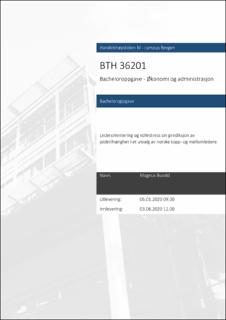| dc.description.abstract | This study examines in which way the different factors of leader status, leader
orientation and role stress affect organizational commitment. The study uses the AFF
leader survey from 2011, which had 2910 responders from Norwegian industry. This
survey was done as a self-report interview and follows the surveys from 1999 and 2002
as the third of its kind. There have been several improvements with the latest version, as
there is used more standard questionnaires to generalize it for equal surveys in other
countries.
Within the subject organizational commitment there is in this study used the affective
commitment component. This component of organizational commitment is defined as
identification with, involvement in and emotionally engaged to the organization. The
questionnaire used is developed by Meyer et al (1993) and has an alpha of 0,77.
As leader status in this study, the top leader is defined to be the top leader of the
independent businesses, while the rest is defined as middle managers.
Within the subject leader orientation there is in this used task- and person-oriented
leadership. There has also been discussed connections between this theory of
leadership and transaction- and transformation leadership. For task orientation the
questionnaires developed by Stogdill (1963) is used and for person orientated the
questionnaire developed by Ahearne et al (2005) is used. This have an alpha of 0,74 and
0,68.
Within the subject role stress, the component of role conflict is used. The questionnaire
used for this was developed in the earlier leadership studies and has an alpha of 0,80.
The data from the survey was used in a correlation analysis and multiple hierarchical
regression analysis. The results are showing a significant positive correlation between
organizational commitment and top leaders and between organizational commitment
and person-oriented leadership. The result also showed a significant negative
correlation between organizational commitment and role stress. There was also
investigated for interaction effects, but this was not found to be significant. | en_US |
